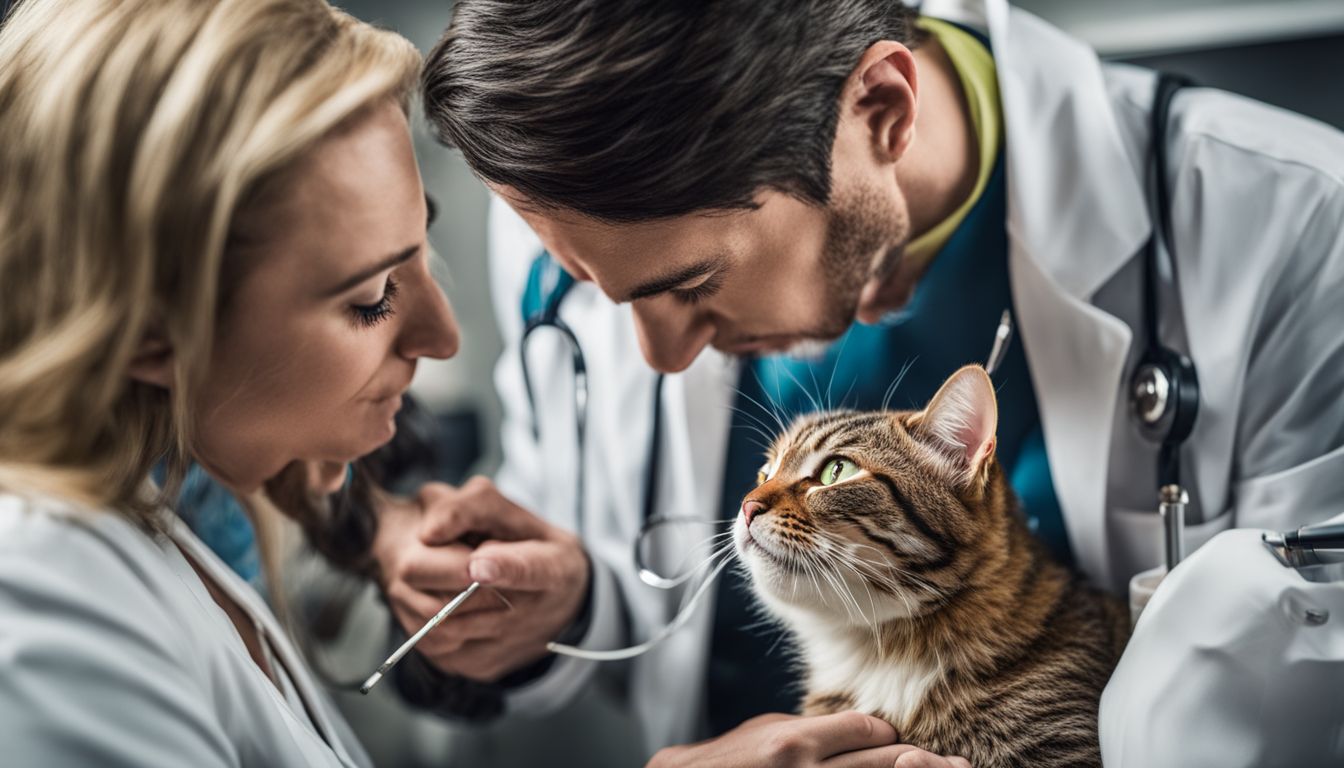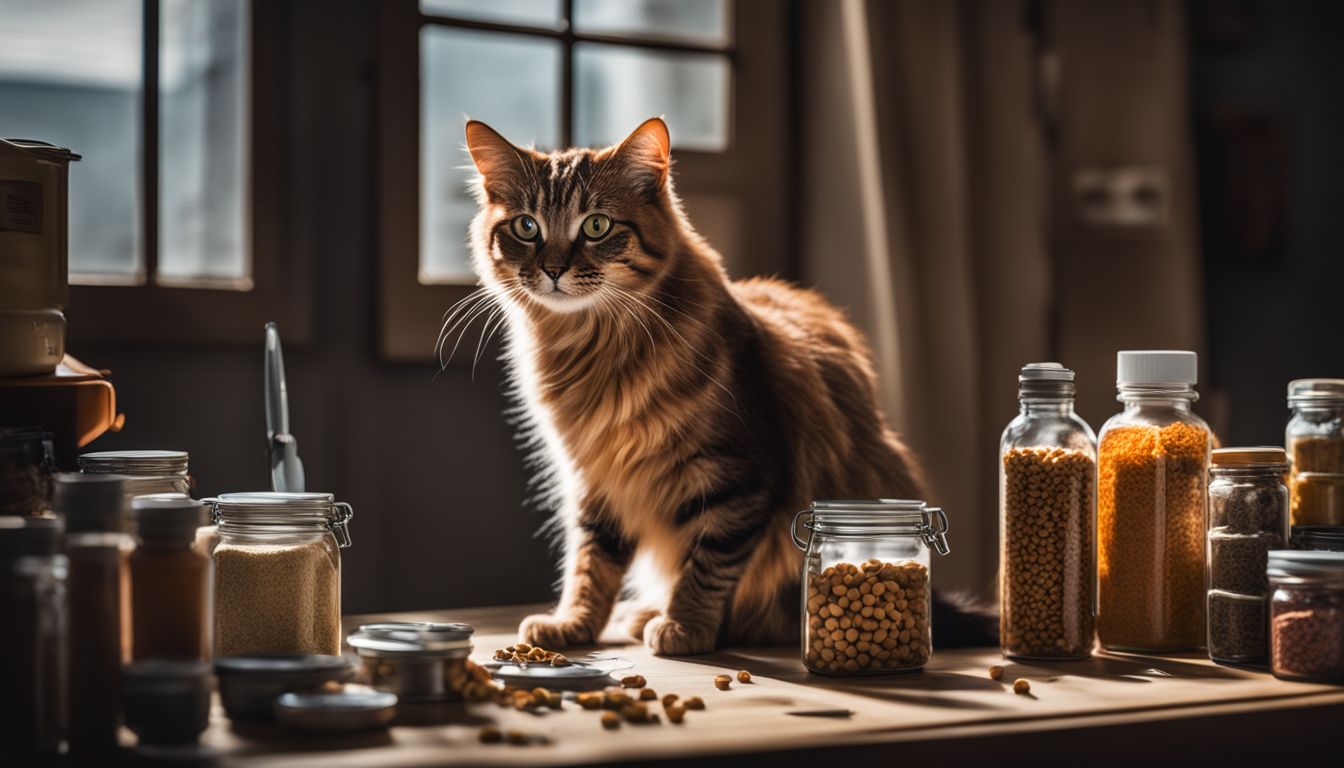Are you a cat breeder experiencing your feline friend coughing and not sure why? In fact, coughing in cats can be caused by a myriad of underlying conditions like asthma, allergies or even heart disease.
This comprehensive guide will delve into the causes, symptoms and treatment options for cat coughing to help alleviate these distressing episodes. So, are you ready to learn more about kitty-sized coughs?.
Key Takeaways
- Cat coughing can have various causes including asthma, hairballs, respiratory infections, pneumonia, cancer, foreign objects, and allergies.
- Symptoms of cat coughing can include wet or dry coughs, coughing with sneezing or wheezing, coughing up hairballs or blood.
- It is important to seek veterinary attention for proper diagnosis and treatment options if your cat is experiencing persistent or worsening coughing.
- Treatment options for cat coughing may include medications for respiratory issues, surgery for tumors or foreign objects in the airway and dietary changes for allergies.
Contents
What Causes Cat Coughing?

Cat coughing can be caused by various factors such as asthma, hairballs, respiratory infections, pneumonia, cancer, foreign objects, and allergies.
Asthma
Asthma can make your cat cough a lot. It’s kind of like an allergy. Your cat’s airways get tight and it’s hard for them to breathe. Cats in homes with smoke or dust often have this problem more.
If your cat has asthma, their chest may move fast when they breathe and they may wheeze too. Medicine from the vet can help stop the coughing and ease their breathing.
Hairballs
Cats get hairballs from licking their fur. The loose hairs stick to the cat’s tongue and then slide down into the belly. Most of this hair goes through the body and comes out in poop.
But sometimes, it stays in the stomach and forms a ball.
Hairballs can make your cat cough too. If you see your cat coughing up a round, wet lump of hair, that’s a hairball. Cats can get sick if they have too many hairballs stuck inside them.
You might need to give medicine or special food to help your cat pass these balls out with their poop.
Respiratory infections
Cats can get respiratory infections. These are like the common cold in humans. They come from viruses and bacteria. Your cat may cough a lot if it has a respiratory infection. It may also have runny eyes, sneezes, or trouble breathing.
The vet can treat this with medicine to kill the germs and make your cat feel better soon.
Pneumonia
Pneumonia is another cause of cat coughing. It occurs when the lungs become infected or inflamed, leading to symptoms like coughing and difficulty breathing. Pneumonia can be caused by bacterial, viral, or fungal infections.
Cats with weakened immune systems are more prone to developing pneumonia. If you suspect your cat has pneumonia, it’s important to seek veterinary attention for proper diagnosis and treatment options.
Treatment usually involves antibiotics or antifungal medications, along with supportive care to help your cat recover.
Cancer
Cancer is another potential cause of cat coughing. Just like in humans, cats can develop tumors that affect their respiratory system and lead to coughing. These tumors can be benign or malignant, and they may grow in the lungs or other parts of the body.
If your cat has cancer, you may notice other symptoms along with the coughing, such as weight loss, decreased appetite, lethargy, and difficulty breathing. It’s important to seek veterinary attention if you suspect cancer as a possible cause for your cat’s cough.
Treatment options for cancer in cats vary depending on the type and location of the tumor. Your vet may recommend surgery to remove the tumor or chemotherapy/radiation therapy to shrink it.
Palliative care measures can also help manage symptoms and improve your cat’s quality of life.
Foreign objects

Foreign objects can sometimes get lodged in a cat’s airway, causing them to cough. This can happen if they accidentally inhale something like a small toy or piece of string. When this occurs, it’s important to seek veterinary attention immediately.
The vet will likely need to remove the object using specialized equipment or perform surgery if necessary. It’s crucial not to delay treatment as foreign objects in the airway can lead to serious complications and even be life-threatening for your cat.
Allergies
Allergies can also be a cause of cat coughing. Just like humans, cats can have allergies too. Common allergens include pollen, dust mites, mold spores, and certain foods. When a cat is allergic to something, their immune system overreacts and causes symptoms like coughing, sneezing, itching, or watery eyes.
If you suspect that your cat’s coughing is due to allergies, it’s important to work with your veterinarian to identify the specific allergen and develop a management plan. This may involve avoiding the allergen if possible or using medications to help control the allergic response in your cat.
Symptoms of Cat Coughing

Cat coughing can present in different ways, including wet or dry coughs, coughing with other symptoms like sneezing or wheezing, and even coughing up hairballs or blood. Understanding these symptoms is crucial for identifying the underlying cause of your cat’s cough.
Read on to learn more about the various symptoms and what they may indicate.
Wet vs. dry cough
Cat coughing can be classified into two types: wet coughs and dry coughs. A wet cough is characterized by the presence of mucus or phlegm, which can indicate an underlying respiratory infection.
On the other hand, a dry cough doesn’t produce any mucus and is often caused by conditions like asthma or allergies. It’s important to pay attention to the type of cough your cat has as it can help determine the possible cause and guide treatment options.
Coughing with other symptoms
When your cat is coughing and displaying other symptoms, it could be a sign of something more serious. Some common additional symptoms to watch for include sneezing, wheezing, and gagging.
If your cat is coughing and also experiencing these symptoms, it’s important to seek veterinary attention. These signs could indicate respiratory infections such as bronchitis or asthma in cats.
Your veterinarian will be able to diagnose the underlying cause through a physical examination and possibly additional tests like X-rays or blood work. Prompt treatment can help alleviate your cat’s discomfort and prevent any further complications.
Coughing and sneezing
Coughing and sneezing in cats can be signs of various respiratory issues. If your cat is coughing or sneezing, it could indicate a respiratory infection, allergies, or even asthma.
Sometimes, coughing and sneezing can be accompanied by other symptoms like wheezing or gagging. It’s important to monitor your cat’s condition and seek veterinary attention if the coughing and sneezing persist or worsen.
A veterinarian will be able to diagnose the underlying cause and recommend appropriate treatment options to help your furry friend feel better.
Coughing and wheezing
Coughing and wheezing are common symptoms that can indicate a respiratory issue in cats. When your cat coughs, it means they are trying to clear something from their airways. Wheezing, on the other hand, is a whistling sound that occurs when there is narrowed or blocked airflow in the lungs.
These symptoms can be caused by various factors such as asthma, respiratory infections, allergies, or even heart disease. It’s important to pay attention to these signs and seek veterinary attention if your cat is experiencing persistent coughing and wheezing.
Treatment options will vary depending on the underlying cause of the symptoms.
Coughing up hairballs
Coughing up hairballs is a common issue for many cats. When cats groom themselves, they can swallow loose fur, which then forms into hairballs in their stomach. These hairballs can cause irritation leading to coughing.
If your cat is coughing up hairballs, it’s important to help them by providing regular grooming and brushing sessions to minimize the amount of loose fur they ingest. You can also try giving them specialized cat food that helps prevent hairball formation.
If the problem persists or if your cat seems uncomfortable, it’s best to consult with a veterinarian who can provide further guidance and treatment options for your furry friend.
Coughing up blood
Coughing up blood in cats can be a serious symptom that requires immediate veterinary attention. It could indicate a variety of underlying health issues such as respiratory infections, lung tumors, or bleeding disorders.
If you notice your cat coughing up blood, it’s important not to ignore it or wait for it to go away on its own. Contact your veterinarian right away so they can properly diagnose the cause and provide appropriate treatment options for your cat’s condition.
Remember, prompt veterinary care is crucial when it comes to any signs of coughing up blood in cats.
Diagnosing the Cause of Cat Coughing

To determine the cause of your cat’s coughing, your veterinarian will need to perform a thorough examination. They may start by asking you questions about your cat’s medical history and any recent changes in their environment.
Then, they will listen to your cat’s lungs with a stethoscope to check for any abnormal sounds.
In some cases, further diagnostic tests may be needed. These can include blood tests, X-rays or other imaging studies, and samples of mucus or tissue for laboratory analysis. These tests can help identify underlying conditions such as respiratory infections, asthma, allergies, or even tumors that may be causing your cat’s coughing.
It is important to work closely with your veterinarian throughout the diagnostic process in order to accurately pinpoint the cause of the coughing and develop an appropriate treatment plan for your furry friend.
Treatment Options for Cat Coughing

Treating cat coughing involves various options, including medications for respiratory infections and asthma, surgery for tumors or foreign objects, and dietary changes for allergies.
Treating asthma and respiratory infections
If your cat is coughing due to asthma or a respiratory infection, there are treatment options available. Here are some ways to help your cat feel better:
- Medications: Your veterinarian may prescribe medications, such as bronchodilators or corticosteroids, to help manage the symptoms of asthma and reduce inflammation in the airways.
- Inhalers: In some cases, using an inhaler with a spacer device can be effective in delivering medication directly into your cat’s lungs.
- Antibiotics: If your cat has a respiratory infection, antibiotics may be prescribed to treat the underlying infection and alleviate the coughing.
- Nebulization therapy: This involves delivering medication as a fine mist that your cat inhales. It can be beneficial for treating respiratory issues.
Medications for heartworm disease
To treat heartworm disease in cats, there are medications available. These medications work to kill the worms and prevent further damage to your cat’s heart and lungs. The most common medication used is an injectable drug called melarsomine, which is given by your veterinarian.
In addition to this treatment, your vet may also prescribe other medications like anti-inflammatory drugs or antibiotics to manage any symptoms and prevent complications. It’s important to follow your vet’s instructions closely and give the medications as directed for the best chance of treating heartworm disease in your cat.
Surgery for tumors or foreign objects
If your cat is coughing due to tumors or foreign objects, surgical intervention may be necessary. The following treatment options are available:
- Tumor removal surgery: If your veterinarian determines that a tumor is causing the coughing, they may recommend surgery to remove it. This procedure aims to remove the tumor and any affected tissues.
- Foreign object removal surgery: If your cat has ingested or inhaled a foreign object that is causing the coughing, surgery may be required to remove it. The vet will carefully locate and extract the object to relieve the coughing symptoms.
Dietary changes for allergies
You can try making some changes to your cat’s diet if they have allergies. Here are a few options:
- Switch to a hypoallergenic cat food that does not contain common allergens like beef, chicken, or grains.
- Introduce novel protein sources such as venison, rabbit, or duck to see if your cat is allergic to the protein in their current food.
- Avoid feeding your cat any treats or table scraps that may contain ingredients they are allergic to.
- Consider a raw or homemade diet with guidance from a veterinarian or veterinary nutritionist.
When to Seek Veterinary Attention

If your cat is coughing persistently or experiencing other concerning symptoms, it is important to seek veterinary attention. Cats with a chronic cough that lasts for more than a few days should be examined by a veterinarian.
It’s also recommended to consult a vet if your cat has difficulty breathing, wheezing, coughs up blood, or shows signs of pain or distress while coughing. Additionally, if your cat’s appetite and energy levels decrease or if there are any sudden changes in behavior, it’s best to schedule a visit with the vet as soon as possible.
Early intervention can help identify and treat any underlying conditions causing the coughing and ensure your cat receives proper care.
FAQs About Cat Coughing
Here are some frequently asked questions about cat coughing:
1. What can cause my cat to start coughing?.
Cats can develop a cough due to various reasons, including asthma, respiratory infections, pneumonia, cancer, hairballs, allergies, and even the inhalation of foreign objects.
2. How do I know if my cat’s cough is serious?.
If your cat has a persistent or worsening cough accompanied by other symptoms like difficulty breathing, wheezing, sneezing, or coughing up blood or hairballs, it’s important to seek veterinary attention as these may indicate a more serious underlying condition.
3. Can secondhand smoke affect my cat’s cough?.
Yes, secondhand smoke can irritate your cat’s respiratory system and contribute to chronic coughing. It is best to keep your home smoke-free and provide a healthy environment for your feline friend.
4. Are there any home remedies for treating my cat’s cough?.
While there are some natural remedies that may help soothe your cat’s throat temporarily (such as steam therapy in a closed bathroom), it is essential to consult with a veterinarian for an accurate diagnosis and appropriate treatment plan.
5. Can allergies be the cause of my cat’s persistent cough?.
Yes, allergies can trigger respiratory issues in cats leading to chronic or recurrent bouts of coughing. Your vet may suggest dietary changes or prescribe medications to manage allergic reactions in your furry companion.
Remember: If you have any concerns or notice changes in your cat’s health behaviors such as persistent coughing or difficulty breathing, it is always best to consult with a veterinarian who can evaluate their symptoms properly and recommend appropriate treatment options
Conclusion

In conclusion, understanding the causes, symptoms, and treatment options for cat coughing is essential for cat owners. Whether it’s asthma, respiratory infections, or allergies causing your cat to cough, prompt veterinary attention is crucial.
By identifying the underlying cause and following appropriate treatment options, you can help alleviate your cat’s discomfort and ensure their overall health and well-being.
FAQs
1. Why is my cat coughing?
Your cat may be coughing due to various causes such as respiratory infections, allergies, asthma, heart disease, or foreign objects in the airways.
2. What are the symptoms of cat coughing?
Common symptoms of cat coughing include frequent hacking or gagging sounds, wheezing, difficulty breathing or rapid breathing, and occasionally bringing up foamy mucus.
3. How can I treat my cat’s coughing?
The treatment for your cat’s coughing depends on the underlying cause. It’s best to consult a veterinarian who can diagnose the cause and recommend appropriate treatment options such as medication or lifestyle changes.
4. Can I prevent my cat from coughing?
While you may not be able to prevent all cases of cat coughing, you can minimize the risk by keeping your cat indoors to reduce exposure to allergens and irritants and ensuring they receive regular vaccinations and check-ups.
5. When should I seek veterinary help for my coughing cat?
If your cat is experiencing persistent or severe bouts of coughing, has trouble breathing, shows signs of distress, loses appetite or weight, it is important to seek veterinary help promptly as these could indicate a serious underlying condition that needs immediate attention.

